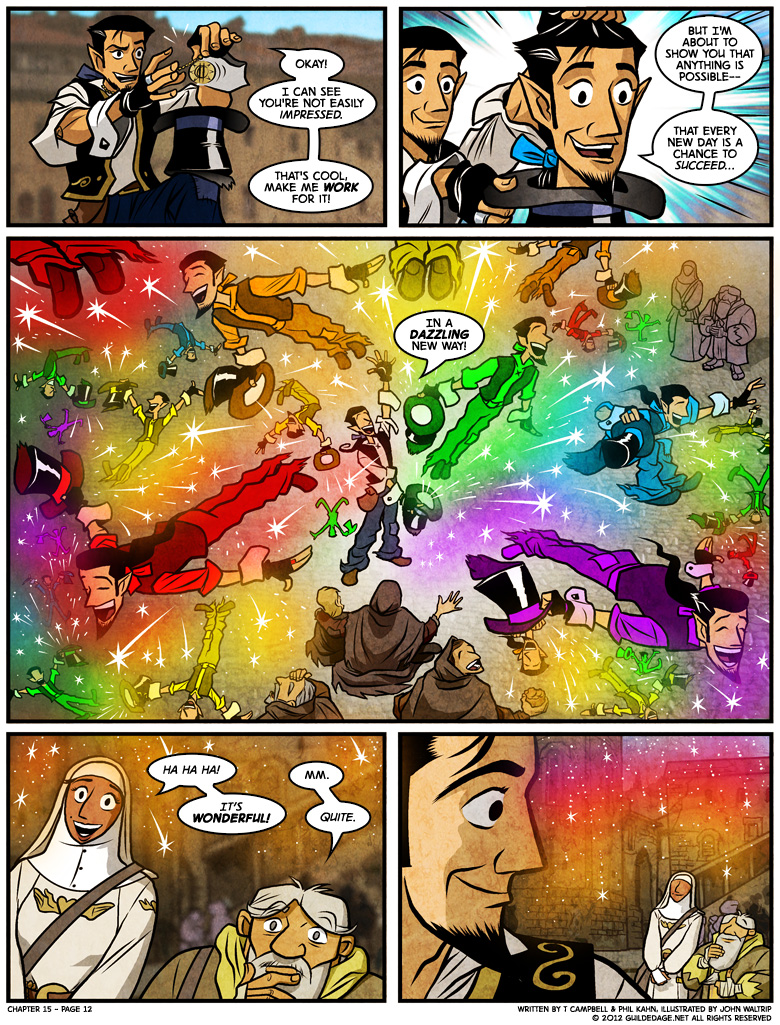Annotated 15-12
 Hmmm, the script doesn’t have the transitional panel 2 in it, with or without Phil’s revisions– the dialogue’s there, it’s just in panel 1. If that was John’s addition, I owe him thanks.
Hmmm, the script doesn’t have the transitional panel 2 in it, with or without Phil’s revisions– the dialogue’s there, it’s just in panel 1. If that was John’s addition, I owe him thanks.
I’ve talked so much about Rachel and Gravedust here that I’ve completely neglected the beggars. Thankfully, E-Merl hasn’t.
He and Rachel both understand, as Gravedust may not, that the needy require nourishment of the spirit as well as the body. They’ve both been down themselves– Rachel abused by Scarlett at least and maybe impoverished beforehand, and E-Merl definitely impoverished for most of his life.
That’s why Rachel introduces herself to the mother and her son with “You will plant again,” and it’s why E-Merl goes all-out… seriously, this is his most impressive illusion to date and one of his best in the series. In their own ways, they’re each saying to the downtrodden, “We believe in you. You are worthy of our trust, you are worthy of our art. Capitalism may not value you at the moment, but we do.”
And this is why E-Merl is, against the apparent odds, starting to get somewhere with Rachel. Yes, she was a bit charmed by his awkward attempt on the previous page, but you’d have to be pretty shallow to be into someone just because they’re into you. You don’t capture Rachel’s attention with flattery, you capture it by doing the kind of unselfish good she can admire. As Frigg has already demonstrated.











Yes , as I recall, there was some kind of flub on this page. I had followed what was in the script, but apparently Phil had something else in mind for panel 1. Whether he had forgotten to write it down or tell T about it, I don’t know, but something had gotten lost somewhere, and Phil was very unhappy with the pencils. He was so upset he couldn’t even talk about it. I told him not to panic, and I would try to fix it, so I moved some things around and put in the transitional panel 2, and that seemed to satisfy everybody. You’re welcome, T.
I hate that, when through unfortunate circumstance you lose a piece of writing, or a drawing, and you can’t remember it quite right. It feels like you were robbed, but you’re not sure what exactly was taken. Incredibly frustrating. And of course it always seems like it was really good because it’s mostly gone.
I was writing a big chunk of lore for a setting I’m working on for a book, and I put a solid few hours and about 10k words into it. I guess it saved wrong, because the file was named right, but when I opened it next it was blank. I was so crushed, you’d have thought someone had died. I was just a bummer to be around for days.
It’s a great scene, so in the end I think it worked out. It’s always nice to have a team to pull you out of the fire when things go wrong like that.
Am I the only one imagining a Renaissance rendition of Final Countdown while E-merl puts on his show?
Bread and circuses. :)
That’s one of the most common mistakes I see with regard to economics: Thinking that “capitalism” can “value” things.
Capitalism is a gestalt system. It values what is valued by the nodes in its neural net; that is to say, all of us. You can’t lie to it. You can’t fake it out. It will see right through all your high-minded speeches about taking care of the poor or respecting the environment or whatever your preferred bit of virtue-signalling is.
The instant you choose to buy from a despicable, dishonest schmuck who mistreats other people (just because he offers a slightly lower price, or fits the latest fashion) capitalism sees you for what you are. And without any conscious thought at all it will give you more of exactly what it is that you truly want, no matter how much you may lie to yourself or to others about what you merely claim to want. Capitalism, in the long-run, judges by actions, not words.
If capitalism doesn’t seem to value the poor and downtrodden, that’s not a fault of its system. It’s a fault in each and every one of us who all think that “someone else” should be the one to help. Fancy words and flowery speeches won’t do a thing to change that unless they’re backed by action. If we want to change the world, we must first change ourselves. There is no economic system that will turn sinners into saints — that’s all on us.
If we can do that, then capitalism will organize our productivity around our charitable goals as swiftly and silently as it has around our selfish ones. It is a system with the sole purpose of channeling scarce resources toward the most strongly desired ends, and it is amazingly efficient at doing so. It just gets a bad rap because it doesn’t play along with the lies we tell ourselves about who we truly are.